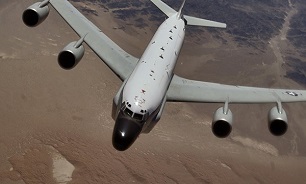US Spy Planes Still Haunting Skies Near Russia
 According to a report by the Russian Defense Ministry, a
total of 16 aircraft were involved in reconnaissance missions near Russia’s
borders. None of the spy planes, however, breached Russian airspace, RIA
Novosti reported.
According to a report by the Russian Defense Ministry, a
total of 16 aircraft were involved in reconnaissance missions near Russia’s
borders. None of the spy planes, however, breached Russian airspace, RIA
Novosti reported.
Last week, the ministry said that Russia scrambled jets four times to chase off foreign reconnaissance aircraft. It was reported that 12 reconnaissance flights were conducted near the Russian border.
According to Russian aviation expert Viktor Pryadka, countries involved in aerial reconnaissance operations usually deny the fact.
"This is how it always was, even in the 1960s, when a Lockheed U-2 spy plane of the United State military flew over Russia and reached Sverdlovsk, Moscow and Leningrad. Washington denied its involvement until the plane was downed in 1960. The Pentagon was shocked that the Russians had an air-defense system capable of taking down a plane at an altitude of some 25 kilometers. Such facts are usually denied until a plane is shot down," Pryadka told Radio Sputnik.
According to Pryadka, aerial reconnaissance remains an important instrument despite the advanced capabilities of space surveillance assets.
"A reconnaissance aircraft allows for making much more accurate pictures than those taken from a satellite. Reconnaissance from space depends heavily on the weather conditions which can distort important details on an image. Earlier, the US used the Lockheed SR-71 plane in reconnaissance operations all around the globe," Pryadka added.
The number of US and NATO reconnaissance flights near the Russian border has spiked over the recent months.
"The number is unprecedented, especially taking into account the fact that there is no Cold War today. At that time, we saw an average of seven-eight intercepts a week. But today the number is much higher," Konstantin Sivkov, a Russian military analyst and president of the Academy for Geopolitical Problems, told Sputnik in late June.
Earlier this year, the Russian Defense Ministry expressed concern over the alliance’s intensified reconnaissance and intelligence activities along the Russian border. Moscow warned that such activities "undermines the balance of forces in the region and increases the risk of military incidents."
